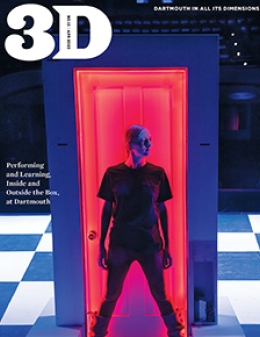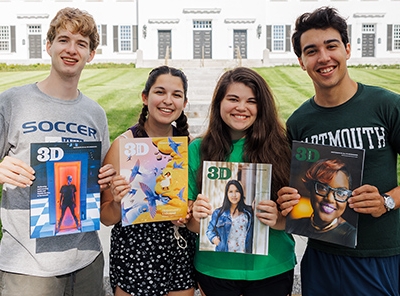Cognitive Scientists Study Options In and Out of the Lab

"It's not like I come into a lab meeting and he says, 'This is what you need to do.' Together, we say, 'Okay, here's our goal. What do we each need to do to get there?' Even though I didn't have that much experience coming in, Jonathan really trusted me to get started putting these studies together."
Eli Hecht '23
he/him/his
Eli Hecht '23
he/him/his
Hometown
Brooklyn, New York
Major
Cognitive Science
Jonathan Phillips
he/him/his
Position
Assistant Professor, Program in Cognitive Science; Affiliated Assistant Professor, Philosophy; Principal Investigator of the PhilLab
After taking Professor Jonathan Phillips' introductory cognitive science course, Eli Hecht '23 was hooked on the study of the mind. the following summer, he asked Professor Phillips if he could become involved in research in the PhilLab. The lab draws on a broad range of methods employed across psychology, philosophy, linguistics, and computer science to better understand questions about how our minds make choices when faced with an array of possibilities. Two years later, the pair sat down with 3D to discuss their work together.
How did you come to study cognitive science?
Professor Phillips
I studied philosophy as an undergrad and was interested in deep questions like ‘How do you live the right life? What's a good moral decision? Do we act freely or not?’ That led me to related questions that we can answer pretty concretely: ‘How do people make those moral decisions? How do we reason about what's possible?’ I started taking philosophical questions and thinking about them as cognitive science questions. I think Eli and I are very similar in loving deep insight into the mind.
Eli
Definitely. It’s so fascinating to me that—through cognitive science—you can connect hard science with bigger questions about how people make decisions. I really like that cognitive science draws on information from different fields like linguistics, computer science, and philosophy.
Together, you’re investigating people's ability to effortlessly understand the various ways a given situation might play out, depending, in part, on the choices made by those involved. Can you break that down for us?
Professor Phillips
I'll tell you a story, then I'll try to unpack it. So, imagine that your friend is telling you that they were the ring bearer at their sister's wedding. They realized ten minutes into the ceremony that they left the ring on the seat of the taxi. Then, that person tells you they decided to blame it on the maid of honor. Now: Did that person have to do that? Your immediate answer is probably ‘no.’ You can intuitively answer that question without ever having actually considered all the alternative things that your friend could have done. The cool idea here is that we seem to have an implicit way of understanding the alternative options that were available for a person in a given circumstance. Our project asks: can we study that set of possibilities rigorously?
Eli
Yes. The main idea is that we recognize that moral decisions and judgments about whether someone was forced to do something depend on context. Our goal is to predict responses to various high-level questions based on the set of answers that people come up with when freely listing actions that PHILLABthe agent in a given scenario could have taken. We’re also investigating how those possibilities end up affecting the different decisions that one makes.
Professor Phillips
We find that when presented with novel problems, people imagine solutions that are remarkably good and that they actually tend to think of the best options first. We then go on to show that without consciously trying, people automatically have an intuitive sense for the kind of options that are likely available and that they use this intuitive sense to guide their decision-making and judgments.
What’s the most rewarding part of working in PhilLab?
Eli
I really appreciate the trust Jonathan has in me to explore these questions. It's not like I come into a lab meeting and he says, ‘This is what you need to do.’ Together, we say, ‘Okay, here's our goal. What do we each need to do to get there?’ Even though I didn't have that much experience coming in, Jonathan really trusted me to get started putting these studies together. He really listens and is receptive to my asking questions and suggesting pivots. Every step of the way has felt like we've talked it through together.
Professor Phillips
I don't expect students to come in with past research experience. What's really key is for you to come in with an excitement about the question you're going to engage in. A lot of the undergraduates in my lab are doing or have done graduate-level work that has been published in great scientific journals. Undergraduates play a really critical role in research at Dartmouth, and that’s my vision for my lab.
So, where does your research go from here?
Eli
We’ve been working on this project for two years and recently submitted it to a top general science journal. It’s so exciting to feel like I really contributed to this project and to know that all our work is paying off.
Professor Phillips
Absolutely. It’s just so much more fun to make discoveries with other people than to go into my office and close the door and just think. The most joyful part of research is to make these discoveries together.
20+1
20 undergraduates and 1 dog are listed on the official roster of folks doing research in PhilLab
60%
of students engage in research
3
Three research labs—the Kraemer Lab, the PhilLab, and the Frankland Lab—are part of the Cognitive Science Department at Dartmouth



